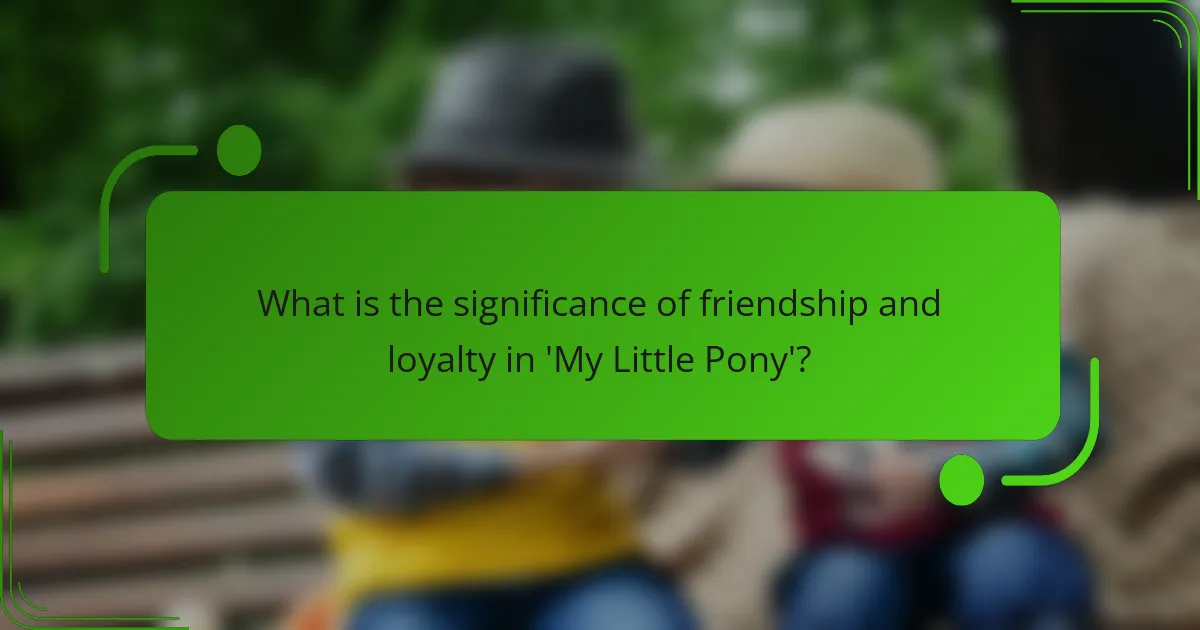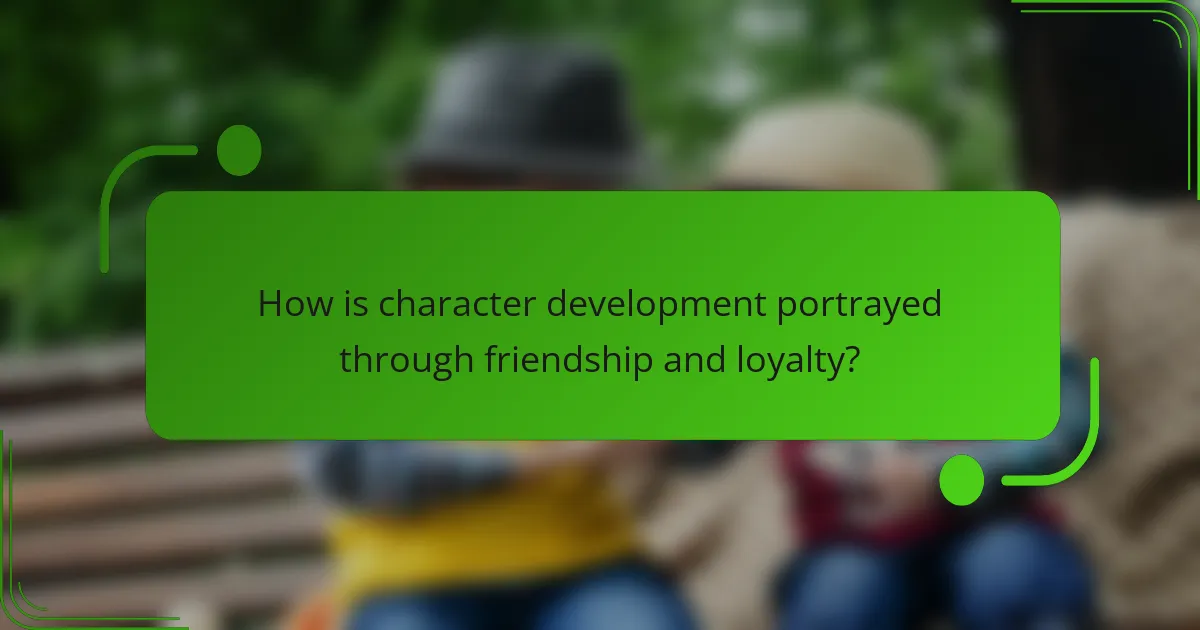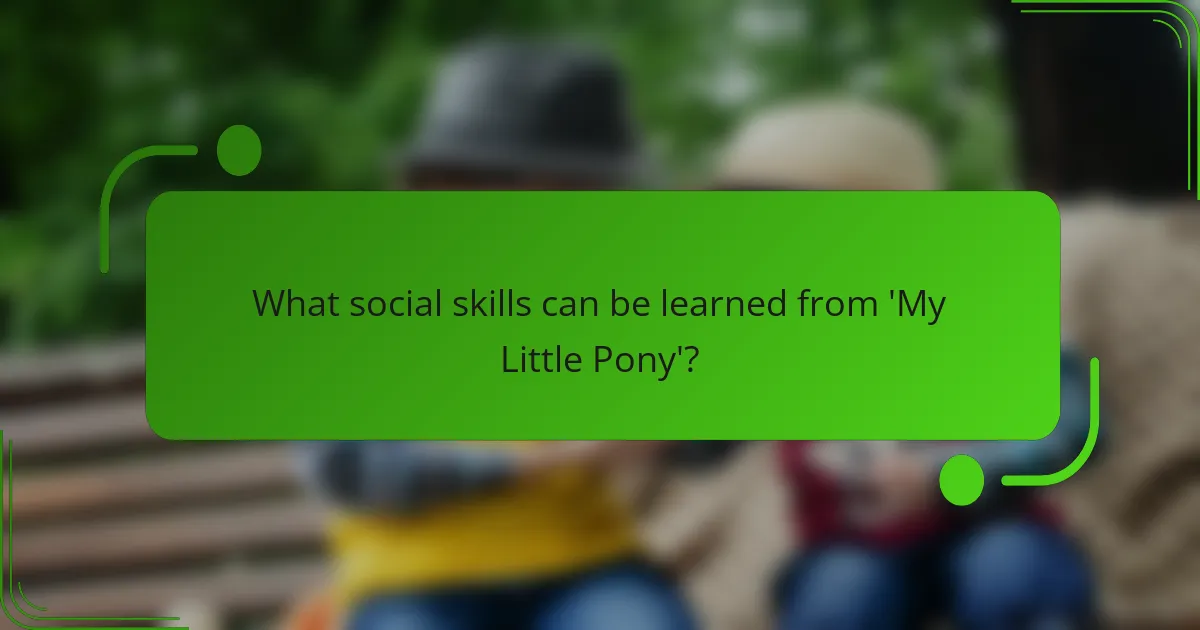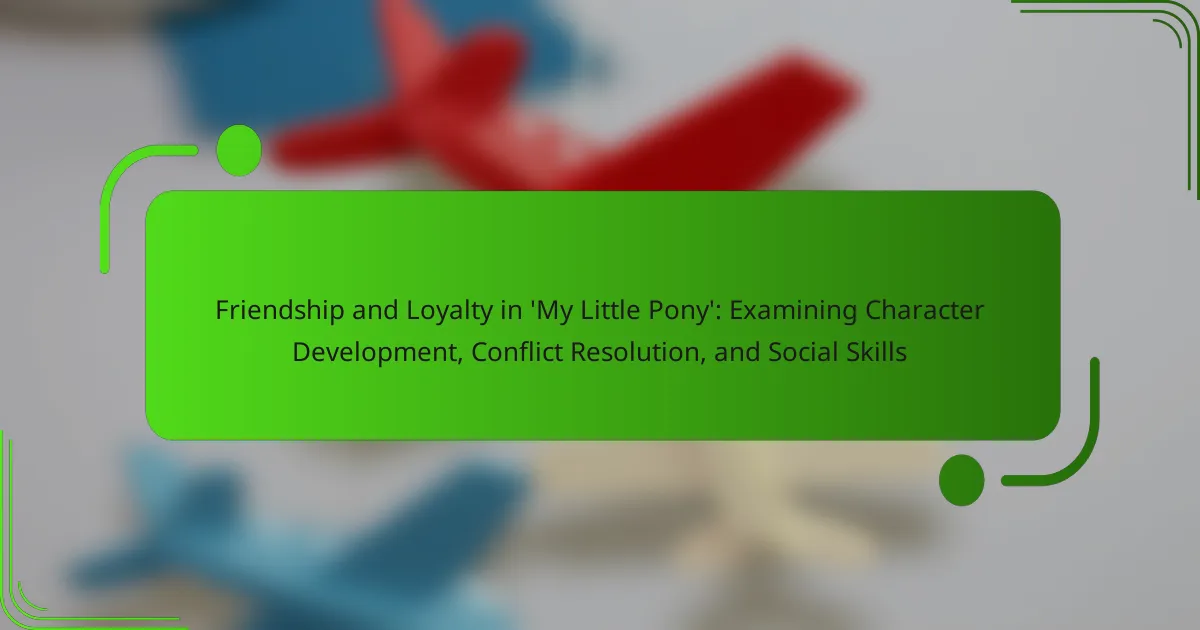The article examines the central themes of friendship and loyalty in ‘My Little Pony,’ focusing on character development, conflict resolution, and social skills. The main characters, known as the “Mane Six,” embody various aspects of these themes, with Twilight Sparkle representing knowledge and Rainbow Dash exemplifying dedication. The narrative illustrates how these qualities foster personal growth and strengthen relationships through challenges that test loyalty. Additionally, the article highlights the significance of the “Elements of Harmony” as symbols of friendship’s power in overcoming adversity, while promoting essential social skills such as empathy, teamwork, and effective communication. Overall, the article provides a comprehensive analysis of how friendship and loyalty are foundational to the series’ moral lessons and character arcs.

What is the significance of friendship and loyalty in ‘My Little Pony’?
Friendship and loyalty are central themes in ‘My Little Pony.’ They drive character development and plot progression. The series emphasizes the importance of these values through the main characters, known as the “Mane Six.” Each character embodies different aspects of friendship and loyalty. For example, Twilight Sparkle represents the pursuit of knowledge and understanding in friendships.
Loyalty is personified by Rainbow Dash, who exemplifies dedication to her friends. The show illustrates how these qualities help resolve conflicts and strengthen relationships. Episodes often depict challenges that test friendships, showcasing the characters’ growth.
The significance of friendship and loyalty is further evidenced by the “Elements of Harmony.” These elements symbolize the power of friendship in overcoming adversity. The series promotes positive social skills and teamwork, teaching viewers about empathy and support. Overall, friendship and loyalty are foundational to the narrative and moral lessons of ‘My Little Pony.’
How do friendship and loyalty manifest in the characters of ‘My Little Pony’?
Friendship and loyalty manifest in ‘My Little Pony’ through the strong bonds among the main characters. The characters demonstrate loyalty by supporting each other in times of need. For instance, Twilight Sparkle often leads her friends in overcoming challenges together. Each character embodies unique traits that contribute to their friendships. Applejack represents honesty and reliability, reinforcing trust within the group. Rainbow Dash exemplifies bravery and determination, often putting her friends’ needs before her own. The series emphasizes teamwork as characters collaborate to solve problems. This cooperative spirit showcases the importance of friendship in achieving their goals. The lessons learned highlight the value of loyalty and support in relationships.
What traits define the friendships among the main characters?
The friendships among the main characters are defined by loyalty, trust, and support. Loyalty is a core trait, as characters consistently stand by each other in times of need. Trust is evident in their ability to confide in one another and share personal challenges. Support manifests through encouragement and assistance during difficult situations. These traits foster deep connections and mutual respect. The characters often demonstrate these traits through collaborative problem-solving and emotional bonding. Their relationships evolve through shared experiences and overcoming conflicts together. This dynamic showcases the importance of friendship in personal growth and social interactions.
How do loyalty and friendship influence character development?
Loyalty and friendship significantly shape character development by fostering trust and resilience. In ‘My Little Pony’, characters like Twilight Sparkle and Rainbow Dash exemplify this influence. Their relationships encourage growth through shared experiences and challenges. Loyalty reinforces commitment, motivating characters to support one another. Friendship promotes empathy, enabling characters to understand diverse perspectives. This dynamic leads to personal evolution and conflict resolution. For instance, when characters face adversity together, they learn important social skills. These interactions ultimately contribute to a deeper understanding of themselves and their roles within the group.
Why are friendship and loyalty central themes in ‘My Little Pony’?
Friendship and loyalty are central themes in ‘My Little Pony’ because they drive character interactions and plot development. The series emphasizes the importance of building strong relationships. Characters often face challenges that test their loyalty and friendship. These themes promote positive social skills among viewers. The show’s core message is that friendship can overcome obstacles. Each episode typically illustrates a lesson about trust and support. This approach encourages empathy and cooperation. The consistent focus on these themes has made ‘My Little Pony’ a beloved series for audiences of all ages.
How do these themes relate to the overall narrative of the series?
The themes of friendship and loyalty are central to the overall narrative of ‘My Little Pony’. They drive character development throughout the series. Each episode typically showcases characters facing conflicts that test their friendships. The resolution of these conflicts often reinforces the importance of loyalty among friends. For example, characters demonstrate growth by learning to support one another in difficult situations. This narrative structure emphasizes the value of social skills in building and maintaining relationships. The consistent focus on these themes creates a cohesive storyline that resonates with viewers. Ultimately, friendship and loyalty shape the characters’ journeys and the lessons conveyed in the series.
In what ways do friendship and loyalty affect character interactions?
Friendship and loyalty significantly shape character interactions by fostering trust and collaboration. Characters often rely on their friendships to navigate challenges. Loyalty strengthens bonds, leading to more open communication. For example, in ‘My Little Pony’, characters like Twilight Sparkle and Rainbow Dash demonstrate loyalty during crises. Their commitment to each other enhances teamwork and problem-solving. Studies show that strong friendships can improve social skills and emotional intelligence. This is evident in episodes where characters resolve conflicts through understanding and support. Overall, friendship and loyalty create a foundation for positive interactions and character growth.

How is character development portrayed through friendship and loyalty?
Character development in ‘My Little Pony’ is portrayed through friendship and loyalty by showcasing how these traits influence personal growth. Characters often face challenges that test their loyalty to friends. Overcoming these challenges leads to deeper bonds and self-discovery. For example, Twilight Sparkle evolves from a solitary figure to a leader through her friendships. Each episode highlights how loyalty fosters trust and encourages characters to confront their flaws. The resolution of conflicts often stems from the strength of these friendships. This dynamic illustrates that loyalty not only supports relationships but also propels individual character arcs forward.
What are key examples of character growth related to friendship?
Key examples of character growth related to friendship in ‘My Little Pony’ include Twilight Sparkle’s journey from a solitary student to a leader who values teamwork. Initially, she prioritizes academic achievement over social connections. Through her friendships with the other ponies, she learns the importance of collaboration and emotional support. Another example is Rainbow Dash, who evolves from a self-centered individual to a loyal friend who prioritizes the needs of her friends. This transformation is evident in episodes where she sacrifices personal glory for the sake of her friends. Additionally, Rarity showcases growth by learning to balance her ambition with the needs of her friends, demonstrating that true friendship involves compromise and understanding. These character developments illustrate the series’ emphasis on the transformative power of friendship.
How do specific episodes illustrate character development through loyalty?
Specific episodes in ‘My Little Pony’ illustrate character development through loyalty by showcasing how characters grow in their relationships. For example, in the episode “The Return of Harmony,” the characters demonstrate loyalty by standing together against Discord. Their unity reinforces their bonds and highlights the importance of loyalty in friendship.
Another example is “The Last Roundup,” where Applejack’s loyalty to her friends leads her to confront her own shortcomings. This episode shows her character growth as she learns the value of honesty and teamwork.
In “The Cutie Mark Chronicles,” the characters reflect on their past experiences of loyalty. Each story reveals how their commitment to one another shaped their identities and strengthened their friendships.
These episodes collectively illustrate that loyalty is a catalyst for character development in ‘My Little Pony.’ They show that loyalty not only fosters unity but also encourages personal growth and self-discovery among the characters.
What role do conflicts play in character growth related to friendships?
Conflicts play a crucial role in character growth related to friendships. They provide opportunities for characters to confront differences and misunderstandings. This confrontation often leads to deeper understanding and stronger bonds. In “My Little Pony,” characters frequently face conflicts that challenge their relationships. For instance, episodes often depict disagreements that require resolution. Through these experiences, characters learn valuable social skills. They develop empathy and improve communication. The resolution of conflicts ultimately strengthens friendships. This pattern is evident across various episodes, showcasing the importance of conflict in character development.
How do characters resolve conflicts while maintaining loyalty?
Characters in ‘My Little Pony’ resolve conflicts while maintaining loyalty through open communication and understanding. They express their feelings honestly, which fosters trust. For instance, when disagreements arise, characters often engage in discussions to clarify misunderstandings. This approach emphasizes empathy, allowing them to see each other’s perspectives. Additionally, they prioritize their friendships, often putting the group’s harmony above individual grievances. This commitment to loyalty is evident in episodes where characters reconcile differences by finding common ground. Ultimately, their ability to balance conflict resolution with loyalty strengthens their bonds and enhances character development.
What strategies do characters use to resolve conflicts in friendships?
Characters in ‘My Little Pony’ use several strategies to resolve conflicts in friendships. They often engage in open communication to express their feelings. This helps clarify misunderstandings and fosters empathy. Characters also practice forgiveness to move past grievances. This allows friendships to heal and strengthen. Additionally, they demonstrate teamwork to solve problems collaboratively. This approach reinforces their bonds and promotes unity. Finally, characters often learn valuable lessons from their conflicts. These lessons contribute to their growth and development as friends.
How does conflict resolution contribute to the theme of loyalty?
Conflict resolution enhances the theme of loyalty by fostering trust and understanding among friends. When conflicts arise, resolving them effectively strengthens relationships. This process demonstrates commitment to one another. In ‘My Little Pony’, characters often face disagreements. They work through these issues, reinforcing their loyalty to each other. For example, when Twilight Sparkle mediates disputes, it showcases her dedication to her friends. Successful conflict resolution leads to deeper bonds and mutual respect. This ultimately aligns with the core values of loyalty depicted in the series.

What social skills can be learned from ‘My Little Pony’?
‘My Little Pony’ teaches various social skills, including empathy, teamwork, and communication. Characters often demonstrate empathy by understanding and sharing feelings with others. Teamwork is emphasized as characters work together to achieve common goals. Effective communication is showcased through dialogue that resolves conflicts and builds friendships. These skills are reinforced through storylines that highlight the importance of supporting one another. The show’s focus on friendship illustrates how social interactions can foster positive relationships. Each episode provides examples of characters navigating social challenges, further reinforcing these skills.
How do characters demonstrate effective communication in friendships?
Characters demonstrate effective communication in friendships by actively listening and expressing their feelings honestly. For example, in ‘My Little Pony’, characters often engage in open dialogues. They share their thoughts and emotions clearly, which fosters understanding. Additionally, they ask questions to clarify misunderstandings. This approach helps resolve conflicts and strengthens their bonds. In episodes, moments of vulnerability showcase their willingness to communicate. Such interactions highlight the importance of empathy and support in friendships. Overall, these behaviors illustrate how effective communication is essential for maintaining strong relationships.
What lessons about empathy can be learned from character interactions?
Character interactions in ‘My Little Pony’ teach valuable lessons about empathy. These interactions highlight the importance of understanding others’ feelings. Characters often face conflicts that require them to put themselves in each other’s shoes. For example, when characters like Twilight Sparkle and Applejack disagree, they learn to listen and validate each other’s perspectives. This process fosters emotional awareness and strengthens their bonds. The show illustrates that empathy leads to conflict resolution and deeper friendships. Research indicates that empathetic interactions can enhance social skills in children. Overall, character interactions serve as practical examples of empathy in action.
How do characters model conflict resolution skills for viewers?
Characters in ‘My Little Pony’ model conflict resolution skills for viewers through their interactions and problem-solving approaches. They demonstrate effective communication by expressing their feelings and listening to others. The characters often face misunderstandings that they must navigate together. They utilize compromise to find mutually beneficial solutions. Additionally, they show empathy by understanding different perspectives. The resolution of conflicts often emphasizes the importance of teamwork and friendship. This modeling helps viewers learn practical skills for resolving their own conflicts. Research indicates that media characters can influence social skills development in children (Valkenburg & Peter, 2011).
What practical tips can be derived from the friendships in ‘My Little Pony’?
Friendships in ‘My Little Pony’ teach valuable practical tips. One key tip is the importance of communication. Characters often resolve misunderstandings through open dialogue. Another tip is to value diversity in friendships. Different perspectives enhance problem-solving abilities. Additionally, loyalty is crucial. Supporting friends strengthens bonds and builds trust. Empathy also plays a significant role. Understanding others’ feelings fosters deeper connections. Lastly, teamwork is essential. Collaborating with friends leads to successful outcomes. These tips are illustrated throughout the series, showcasing effective social skills and character development.
How can viewers apply lessons of loyalty in their own friendships?
Viewers can apply lessons of loyalty in their friendships by consistently supporting their friends in times of need. This means being present during difficult moments and offering help without hesitation. Loyalty also involves standing up for friends when they face challenges or criticism. By defending their friends, viewers demonstrate commitment and trustworthiness. Additionally, maintaining open communication fosters loyalty. Sharing thoughts and feelings openly helps to strengthen bonds. Engaging in shared experiences can further enhance loyalty. Participating in activities together builds memories and reinforces connections. Lastly, showing appreciation for friends cultivates loyalty. Expressing gratitude strengthens relationships and encourages mutual support.
What strategies can enhance conflict resolution skills inspired by the series?
Effective strategies to enhance conflict resolution skills inspired by the series include active listening and empathy. Active listening involves fully concentrating on the speaker, which fosters understanding. Empathy allows individuals to relate to others’ feelings, promoting connection.
Additionally, open communication is crucial. This means expressing thoughts and feelings clearly and respectfully. The series showcases characters who resolve disputes by discussing their perspectives openly.
Collaboration is another key strategy. Working together to find solutions encourages teamwork and strengthens relationships. The series often highlights characters uniting to overcome challenges.
Finally, practicing patience is essential. Taking time to reflect before responding can prevent escalation. The characters demonstrate this by pausing to consider their actions before reacting.
These strategies, illustrated throughout the series, provide valuable lessons in conflict resolution.
The main entity of the article is ‘My Little Pony,’ focusing on the themes of friendship and loyalty as they relate to character development, conflict resolution, and social skills. The article examines how the main characters, known as the “Mane Six,” embody these values and demonstrate their significance through various interactions and challenges. It highlights the traits that define their friendships, the impact of loyalty on character growth, and the lessons viewers can learn about effective communication and empathy. Additionally, it discusses specific episodes that illustrate these themes and offers practical strategies for applying these lessons in real-life friendships.
